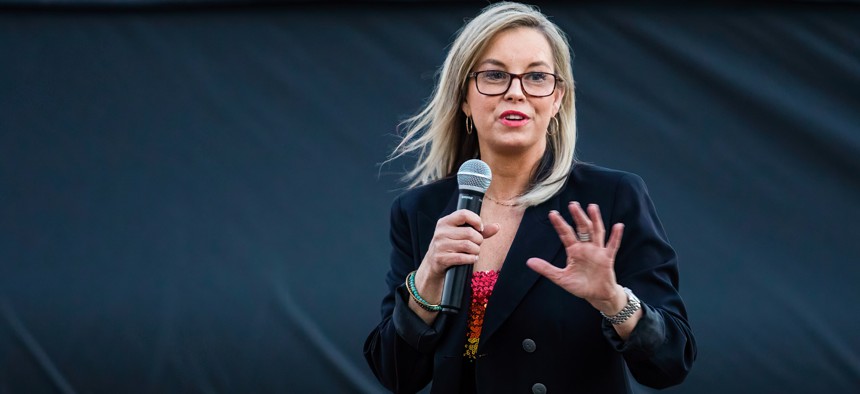Mayors: There’s a Mental Health Crisis in Every City

For Reno, Nevada, Mayor Hilliary Schieve, the issue of mental health is a personal one. Ty O'Neil/SOPA Images/LightRocket via Getty Images
It is causing drug overdoses and homelessness in cities across America. But with the debt deal to freeze spending, it is uncertain whether federal help is coming.
Mental health struggles are getting worse, says Hillary Schieve, the mayor of Reno, Nevada.
“People are dying on our streets,” she says, “and they are dying from lots of mental illness-related causes and drug addictions.”
Schieve, who was elected president of the U.S. Conference of Mayors earlier this month, is far from alone in citing a growing mental health crisis in her community. In a new survey by the group, 113 out of 117 mayors in 36 states, or 97%, said the number of people seeking help for issues ranging from substance abuse to depression to loneliness has increased in the last couple of years.
A majority of the mayors—88%—also said their cities do not have enough services to meet the growing need.
But less than two weeks after the survey was released, funding to help local governments deal with the issue could be in jeopardy.
Under the deal President Joe Biden cut with Republican House Speaker Kevin McCarthy to keep the nation from defaulting on its debt, spending in next year’s budget will be no higher than this year’s levels. While Republicans have not released any specifics on what funding might be impacted, reducing spending to what it was last year could undo the $1 billion funding increase the Substance Abuse and Mental Health Services Administration received in this year’s budget.
For Schieve, the issue is a personal one. Her own sister suffered from debilitating depression for years, and following a battle with breast cancer and a double mastectomy, her depression worsened.
“She became even more paralyzed by her mental health,” she says. “Then she stopped going to treatment.”
Six weeks after her sister died from breast cancer, Schieve’s brother died unexpectedly. He had mental health issues as well, and had struggled with drug addiction.
“I didn't talk about it for a very long time because, you know, I have this massive stigma. I never wanted to shame them ever,” says Schieve, who wrote briefly about her family’s struggles in an opinion piece in Route Fifty last year. “After they had passed away, I decided that if your mayor is not talking about that, who is?”
Schieve adds that she’s learned that even some of her fellow mayors are struggling with their own mental health. “Mayors the last couple of years have taken on a pretty big task with this pandemic and are having their own personal issues.”
Fast forward to the June 2 survey by the U.S. Conference of Mayors and Schieve says the main takeaway is that mayors and their cities need help.
In the survey, mayors said the most common problem is substance abuse, with two-thirds saying it’s a problem. After that, the next biggest issue is homelessness. More than half, 56%, said mental illness was causing people to end up on the streets in their cities. The same percentage said their cities do not have enough mental health workers, including school counselors.
To try to correct the lack of mental health workers, Reno spent $1 million to provide free virtual mental health counseling to all Reno residents during the pandemic.
The city is currently in the process of creating a mental health center, staffed by nonprofits, to provide treatment 24 hours a day, and seven days a week. But Schieve says that the funding took too long.
“I've been trying for five years to put in a mental health crisis center, and I just now am getting the money,” she says, adding, “Right now, most people in America would go to an ER for a mental breakdown. That is a place where they treat broken bones. We’ve got to redesign what this looks like in this country because we're failing drastically.”
Other approaches cities have been taking, according to the survey, include sending mental health officers along with police to respond to 911 calls, or diverting calls for help that involve mental health to counselors instead of police and fire dispatchers.
In Mesa, Arizona, for instance, 3,500 calls were sent to a mental health crisis line instead of to the dispatchers. The crisis line also created mobile teams that have lowered the time it takes for mental health counselors to arrive at the scene of an incident.
Despite those efforts, Schieve said mayors are feeling “overwhelmed” and need more funding, more direct funding. She is critical of the fact that federal mental health funding through the Substance Abuse and Mental Health Services Administration goes to states, which in turn sends most of the money to counties, not cities.
But Jonah Cunningham, president and CEO of the National Association of County Behavioral Health and Developmental Disability Directors, says counties are struggling as well. More federal funding would help both counties and cities, he says. “A rising tide would lift all boats.”
Under the debt deal, though, SAMSHA could see a $150 million cut in mental health block grants and another $100 million cut to the Substance Abuse Prevention and Treatment block grants.
That could mean “fewer Naloxone kits that are getting purchased or individuals being trained in mental health first aid, workers being hired to staff call centers,” says Cunningham.
Ultimately, Cunningham doesn’t think Senate Democrats will be likely to go along with many of the cuts, which could lead to another “showdown” over spending in Congress as the deadline for the omnibus approaches in September.
Kery Murakami is a senior reporter for Route Fifty, covering Congress and federal policy. He can be reached at kmurakami@govexec.com. Follow @Kery_Murakami
NEXT STORY: Opioid Settlement Payouts to Localities Made Public for First Time






